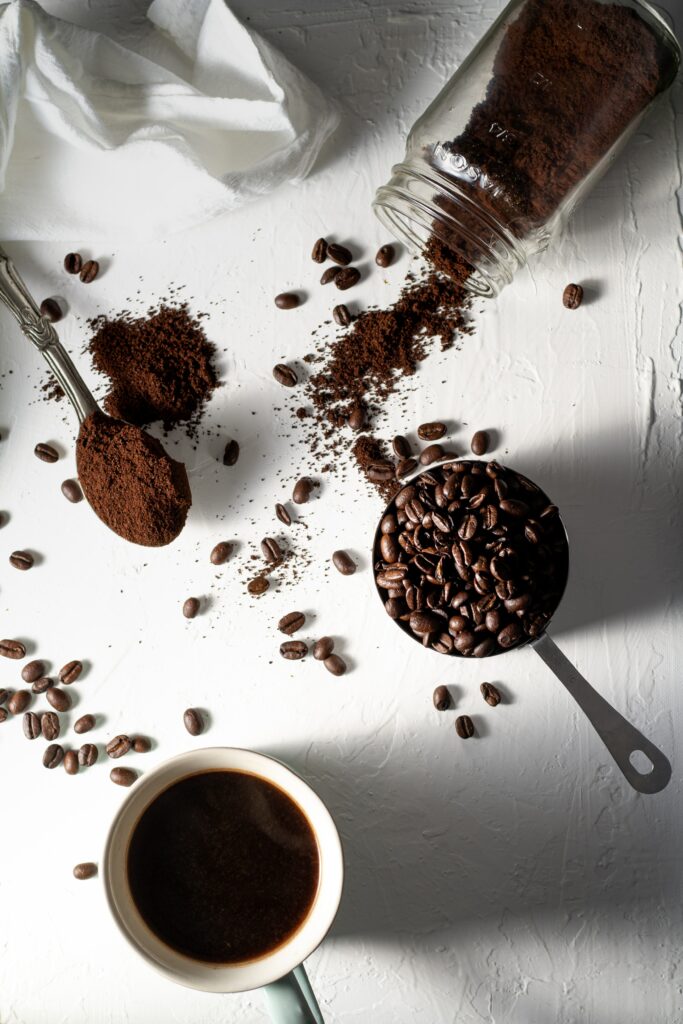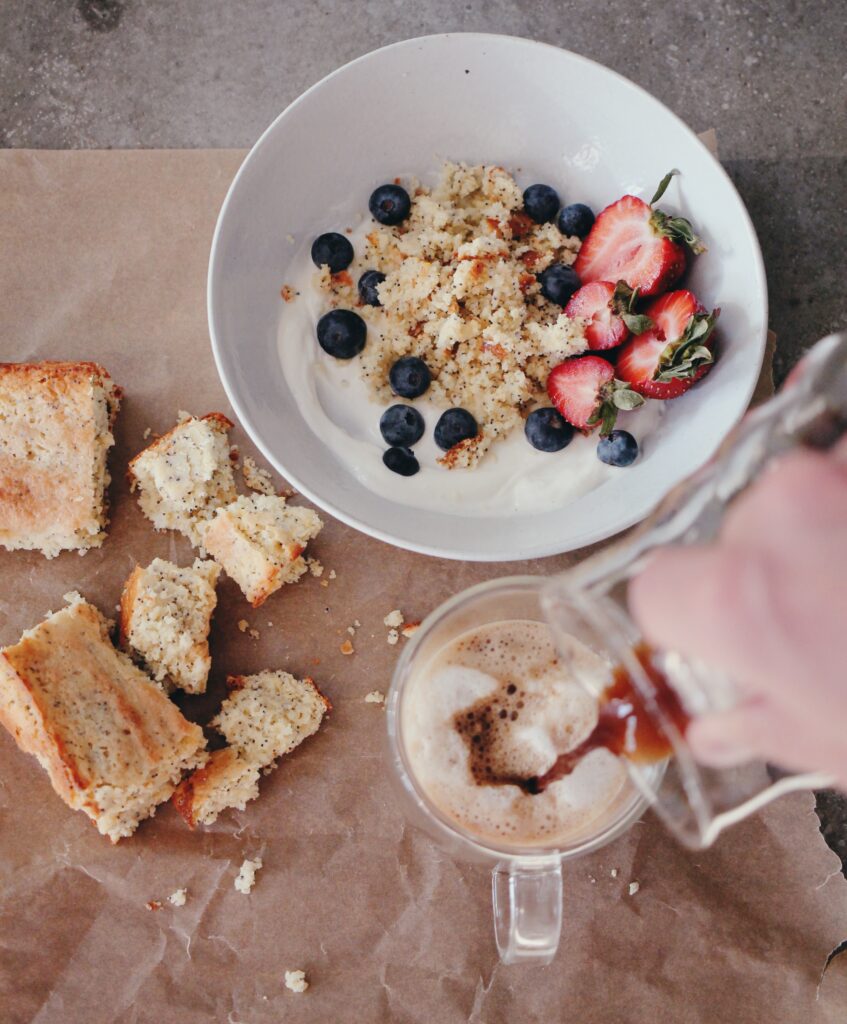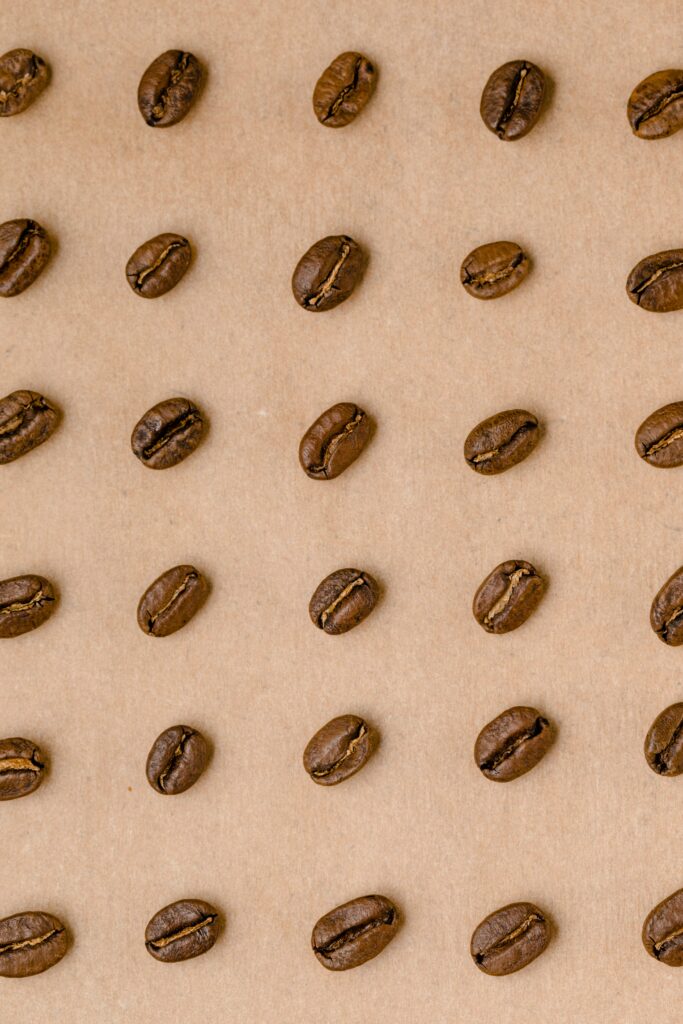Diving right in: what you eat and drink directly impacts your hormones. In other words, your diet plays a significant role in maintaining healthy hormonal balance. The right foods—and the right balance of these foods—can ensure happy hormones. Au contraire, consuming too many inflammatory oils, ultra-processed foods, and sugar can cause imbalances. While there’s no need for restriction or deprivation, it is important to understand that food has the power to support a normal menstrual cycle, minimize PMS, improve fertility, and more. When it comes to coffee and hormones, what does the data say? And does caffeine increase estrogen? Let’s uncover the facts.

WHAT IS CAFFEINE?
Truth be told, most of life’s activities are made easier with a cup of caffeine. But what exactly is caffeine? It’s a natural stimulant—a drug. It works by stimulating your brain and central nervous system, helping you stay alert. Contrary to popular belief, caffeine doesn’t actually give you energy. Instead, it prevents the onset of tiredness. In many ways, your cup of coffee acts as an adenosine receptor antagonist. This is a chemical that promotes sleepiness. As soon as you take your first sip of caffeine, it blocks the adenosine receptor. At the same time, it triggers the release of adrenaline—a double whammy.
POPULAR Sources of CAFFEINE
Caffeine ranks as one of the most commonly consumed dietary ingredients across the globe. It is naturally found in coffee beans (of course!), but it’s also present in cacao beans, kola nuts, guarana berries, and tea leaves. It can also be made, synthetically. Coffee and tea are the two most prominent sources, but sodas and energy drinks rank high as well. Curious to know how much caffeine is in your shot of espresso? Here’s the gist:
COFFEE
1 cup (or 8 ounces) of brewed coffee contains about 95 mg of caffeine. The same amount of instant coffee contains about 60 mg of caffeine. Decaffeinated coffee only contains about 4 mg of caffeine.
ESPRESSO
1 shot or (1.5 ounces of coffee) contains about 65 mg caffeine.
TEA
1 cup of black tea contains about 47 mg caffeine. Green tea contains about 28 mg. Decaffeinated tea contains 2 mg, and herbal tea contains none.
SODA
A 12-ounce can of regular or diet dark cola contains about 40 mg caffeine.
CACAO
1 ounce of dark chocolate contains about 24 mg caffeine, whereas milk chocolate contains much less caffeine.
ENERGY DRINKS
1 cup (or 8 ounces) of an energy drink contains about 85 mg caffeine. However, the standard energy drink serving is 16 ounces, which doubles the caffeine to 170 mg. Energy shots are much more concentrated, though. A small, 2-ounce shot contains about 200 mg caffeine.
SUPPLEMENTS
Caffeine supplements contain about 200 mg per tablet or the amount in two cups of brewed coffee.

Fast vs. Slow caffeine metabolizer
For most, caffeine works its magic very quickly—reaching a peak level in the blood within 30-60 minutes. About three hours later, it begins the elimination process. However, the remaining amount of caffeine can stay much longer. Often, that’s why it’s not recommended to drink coffee in the afternoon. Ultimately, it depends on if you’re a “fast metabolizer” or a “slow metabolizer.” This all comes down to our genes. The fast group breaks down caffeine more quickly than the slow group. And thus, the effects of caffeine don’t last as long for this group. That said, if you’re implementing healthier ways to drink coffee, you can slow down caffeine’s ticking clock.
HOW DOES CAFFEINE IMPACT YOUR BODY?
If you aren’t sure how caffeine impacts your body, start to take note of how you feel when (and after) you drink it. Do you experience jitters, poor sleep, digestive woes, anxiety, or worsened PMS symptoms? Furthermore, consider why you drink it. Is a ritual or a dependency? If you notice adverse symptoms shortly after drinking coffee and / or you’re using it to compensate for undernourishing dietary habits, it’s worth re-considering your coffee habit. Additionally, chat with your healthcare provider if you’re pregnant.

CAFFEINE AND HORMONES: A COMPLEX CONNECTION
While caffeine seems to increase cortisol levels—especially when combined with other stressors—the link between caffeine and hormones is nuanced. It’s not as black-and-white as drinking caffeine or abstaining. That said, observational studies find a correlation between caffeine and hormones. Meaning, there’s a link, but there’s no proof that caffeine causes changes in hormones. It’s possible that some other behavior or inherent trait, common in people who consume more caffeine, is responsible for the differing hormone levels. Think: diet, exercise, sleep, stress, and supplement use.
Do women metabolize coffee differently than men?
Yes. And research proves it. Just as women metabolize alcohol more slowly than men do (and feel the negative effects after fewer servings), caffeine is no different. Women also tend to metabolize it at a slower rate. The female body is brilliantly designed to conserve as much energy from whatever we’re consuming. In turn, we can grow babies. In essence, this means that our bodies are built to retain fluids for much longer—and to metabolize the chemicals contained much more slowly. In part, we have higher levels of estrogen (than men) to thank for this.

SIGNS AND SYMPTOMS of ESTROGEN DOMINANCE
While women need higher levels of estrogen than men, too much of this hormone leads to estrogen dominance. Unfortunately, without proper balance from other sex hormones, estrogen dominance can lead to an array of unpleasant symptoms: hair loss, low sex drive, weight gain, digestive issues, cold hands and feet, fatigue, tender and swollen breasts, and non-cancerous breast lumps. High levels of estrogen can also cause PCOS, uterine fibroids, irregular menstrual cycles, and thyroid dysfunction.
How to lower estrogen, naturally
The good news is, there are many lifestyle changes that can naturally lower estrogen levels. Beyond removing endocrine disruptors from your home, incorporating meditation and exercising with your menstrual cycle are key. Furthermore, eating a low-estrogen diet is a practical, sustainable way to help balance hormones.
Does caffeine increase estrogen?
As mentioned, the caffeine-hormone connection is convoluted. When it comes to estrogen, specifically, caffeine appears to affect women differently by racial groups. For example, one study shows that higher caffeine consumption was associated with higher estrogen levels for Asian women. However, the exact reverse effect was found for white women—higher caffeine intake was associated with lower estrogen levels. In Black women, there was a slight rise in estrogen levels, but it wasn’t statistically significant. Ultimately, conflicting reports makes it difficult for medical providers to accurately predict hormonal fluctuations. It’s also important to remember that estrogen levels differ in every woman and change throughout her monthly cycle.

Should You Avoid Coffee If You’re Trying to Balance Your Hormones?
This depends. First and foremost, what type of hormone imbalance are you dealing with? Examples of hormone imbalances: estrogen dominance, low testosterone, a thyroid issue, PCOS, chronically elevated cortisol, insulin imbalance, etc. Work with your healthcare provider, or a functional medicine doctor, to diagnose your specific hormone imbalance(s). At any rate, caffeine can cause your body to produce extra cortisol. And while we need some cortisol, high cortisol levels can affect your body’s ability to regulate inflammation. If you can’t quit your morning coffee, swap to a high-quality coffee with adaptogens and drink it after you’ve had a blood sugar-friendly breakfast.

4 WAYS TO MAKE YOUR COFFEE MORE HORMONE-FRIENDLY
All of that said, below are a few tips to help your coffee work for your hormones, not against them. There are plenty of nourishing ways to drink coffee. See here for a video version of this info!
1. CHOOSE ORGANIC COFFEE BEANS.
This goes without saying, but the higher-quality your beans, the fewer pesticides you’re consuming. This is healthier for your body (and the planet). Unfortunately, coffee beans tend to be sprayed with synthetic pesticides and other chemicals that were never intended for human consumption. I love Mommee Coffee (organic, fair-trade, etc.)—plus, they have full-caf, half-caf, and decaf options.
2. DON’T DRINK IT ON AN EMPTY STOMACH.
If you experience things like restlessness, jitters, or anxiety after drinking coffee, you’re not alone. According to Frontiers in Psychiatry, there is evidence to back up a correlation between higher caffeine intake and anxiety symptoms for many people. If you’re someone who feels anxious after drinking coffee or are naturally prone to anxiety or panic attacks on a regular basis, the quicker “hit” of caffeine to your bloodstream from drinking your morning cup on an empty stomach might trigger unwanted symptoms. Therefore, be sure to eat your breakfast first. As mentioned, this is very important for balancing hormones, too!
3. ADD PROTEIN OR HEALTHY FATS TO YOUR CUP.
If you tend to skip breakfast in the morning, this is particularly helpful. By adding protein and / or healthy fats, you’re automatically increasing your daily requirements of those macronutrients. Plus, they aid in sustained and prolonged energy, help manage blood sugar, encourage digestion (coffee can be very acidic!), and can aid in hormone balance.
4. AVOID LOW-FAT OR ARTIFICIAL SWEETENERS.
Speaking of adding protein or healthy fats, be mindful of what else you’re putting in your coffee. Commercial low-fat and artificial creamers tend to be highly processed and may contain questionable ingredients. Instead of a non-dairy creamer, consider adding some full-fat cream to your coffee, preferably from grass-fed cows. If you’re going to add sugar, opt for raw honey, stevia, or monk fruit! In terms of caffeine and hormones, being mindful of sugar is key. See here for low-glycemic sugar alternatives.
Hormone balance ebook
Ready to take the next step in your hormone-healing journey? Grab your copy of Master Your Menstrual Cycle—my holistic guide to balancing your hormones with ease. Available for only $15!
This article is for informational purposes only. It is not, nor is it intended to be, a substitute for professional medical advice, diagnosis, or treatment and we recommend that you always consult with your healthcare provider.



Leave a Reply